•
FILMS SYNOPSES
• 2004
Modern Times (Director: Charlie Chaplin, 1936, digitally
restored 2003, 87 min)
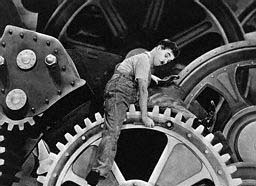 Chaplin's masterpiece, without question the last great silent film,
made when everyone else was making talkies, is filled with sound
effects—the screeches, groans, and grinds of the machines—that
speak against modern society, the machine age, and progress. The
Little Tramp gets trapped in the coils of automation in this corrosive
satire on the dehumanizing effects of technology. Despite its pre-occupation
with Depression-era poverty and starvation, the film comes off as
a lighthearted comedy.
Chaplin's masterpiece, without question the last great silent film,
made when everyone else was making talkies, is filled with sound
effects—the screeches, groans, and grinds of the machines—that
speak against modern society, the machine age, and progress. The
Little Tramp gets trapped in the coils of automation in this corrosive
satire on the dehumanizing effects of technology. Despite its pre-occupation
with Depression-era poverty and starvation, the film comes off as
a lighthearted comedy.
Link to Film Forum page for Modern Times.
A Day´s Work, A Day´s Pay (Producer:
Jonathan Skurnik, 2002, 57 min)
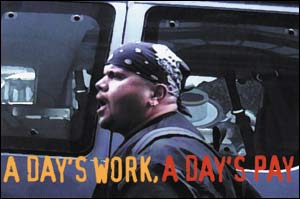 This documentary follows three welfare recipients in New York City
from 1997 to 2000 as they participate in the largest welfare-to-work
program in the nation. When forced to work at city jobs for well
below the prevailing wage and deprived of the chance to go to school,
these individuals decide to fight back, demanding programs that
will actually help them move off of welfare and into jobs.
This documentary follows three welfare recipients in New York City
from 1997 to 2000 as they participate in the largest welfare-to-work
program in the nation. When forced to work at city jobs for well
below the prevailing wage and deprived of the chance to go to school,
these individuals decide to fight back, demanding programs that
will actually help them move off of welfare and into jobs.
Link to New Day Films page for A Day´s Work, A Day´s
Pay.
At the River I Stand (Directors: David Appleby,
Allison Graham & Steven Ross, 1993, 56 min)
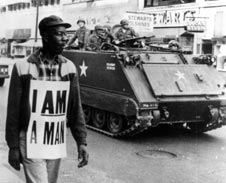 This classic documentary recaptures the 1968 struggle for economic
justice among Memphis' sanitation workers, who earned so little
they qualified for welfare. In the film, retired workers recall
their fear as they challenged the white power structure when they
went on strike for higher wages and union recognition. The black
community mobilized behind the strikers, organizing mass demonstrations
and an Easter boycott of downtown businesses. In March of 1968,
Martin Luther King traveled to Memphis as part of his "Poor People's
Campaign" to expand the civil rights agenda to include economic
justice. King planned to march again on April 8, 1968, but was assassinated
four days earlier. A nonviolent march was held nonetheless, leading
to the city council granting most of the strikers' demands. At the
River I Stand was described in the Dallas Observer as "one of the
most clearheaded, evenhanded documentaries about the civil rights
movement you'll ever see, and a piece of gripping storytelling as
well."
This classic documentary recaptures the 1968 struggle for economic
justice among Memphis' sanitation workers, who earned so little
they qualified for welfare. In the film, retired workers recall
their fear as they challenged the white power structure when they
went on strike for higher wages and union recognition. The black
community mobilized behind the strikers, organizing mass demonstrations
and an Easter boycott of downtown businesses. In March of 1968,
Martin Luther King traveled to Memphis as part of his "Poor People's
Campaign" to expand the civil rights agenda to include economic
justice. King planned to march again on April 8, 1968, but was assassinated
four days earlier. A nonviolent march was held nonetheless, leading
to the city council granting most of the strikers' demands. At the
River I Stand was described in the Dallas Observer as "one of the
most clearheaded, evenhanded documentaries about the civil rights
movement you'll ever see, and a piece of gripping storytelling as
well."
Link to California Newsreel page for At the River I Stand.
Shots on the Docks (Producer: Steve Zeltzer, 2003,
28 min)
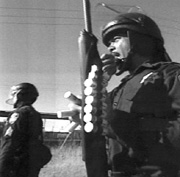 The stepped up repression of anti-war demonstrators and trade unionists
took a new turn in the U.S. on April 7, 2003, when Oakland, California
police attacked a peaceful picket on the docks. The Labor Video
Project was there when Oakland police fired over a hundred shots
of rubber bullets and wooden projectiles as well as concussion grenades
to attack the anti-war protest. This video interviews the workers
on the picket line as well as ILWU longshoremen who were standing
by and were also targeted by the police and the company. It goes
behind the pictures to expose the reasons that trade unionists joined
the line and the reaction of ILWU Local 10 members to the attacks
and arrests of their business agent. There is also an international
campaign to defend ILWU BA Jack Heyman and the Oakland 25 who face
criminal charges for the April 7 incident.
The stepped up repression of anti-war demonstrators and trade unionists
took a new turn in the U.S. on April 7, 2003, when Oakland, California
police attacked a peaceful picket on the docks. The Labor Video
Project was there when Oakland police fired over a hundred shots
of rubber bullets and wooden projectiles as well as concussion grenades
to attack the anti-war protest. This video interviews the workers
on the picket line as well as ILWU longshoremen who were standing
by and were also targeted by the police and the company. It goes
behind the pictures to expose the reasons that trade unionists joined
the line and the reaction of ILWU Local 10 members to the attacks
and arrests of their business agent. There is also an international
campaign to defend ILWU BA Jack Heyman and the Oakland 25 who face
criminal charges for the April 7 incident.
Link to ILWU
Jack Heyman's web site.
Miami 2003: Your Tax Dollars at Work (Director:
Lisa Mastramico, 2003, 12 min)
During the week of November 17, thousands of people converged in
Miami to demonstrate their opposition to the proposed Free Trade
Area of the Americas, which was being negotiated behind closed doors.
What we found when we arrived was an extremely arrogant and militarized
police force that had received over $10M in tax dollars, which they
used to make it very clear what one would face if they wanted to
protest—peacefully or not. However you feel about free trade,
you should care about what happened on the streets of Miami in November
of 2003.
Friends or Foe (Director: Jiyoung Lee, 2003, 119min)
When KT (Korean Telecommunication) initiated the structural adjustment
plan in 2000, the non-regular workers became the main target for
their so-called downsizing. Although the targeted workers launched
the new union of their own, eventually 7,000 workers were fired
altogether. In December, the struggle began and the workers continued
the struggle by any means necessary for 517 days, they finally lost
in the midst of the oppression by the police and the betrayal by
the regular workers. Friend or Foeis a detailed document
of their struggle which exposes the serious situation broadly imposed
by globalization on the workers being compelled to accept non-regular
status and provides a critical analysis of the weakness of the current
labor movement. Directed by award-winning female director Jiyoung
Lee who won the Best documentary prize at 2002 Pusan International
Film Festival with On the Right Trackabout the railway workers
struggle for democratizing the trade union. Produced by Labor News
Production, Seoul.
Fiat Respect (Director: Regan Brashear, 2003, 30
min)
 Live footage of the historic statewide strike by clerical workers
in the Coalition of University Employees (CUE) and lecturers in
the University Council-American Federation of Teachers (UC-AFT)
who protested at five campuses against the abundant unfair labor
practices of the University of California. This fast-paced film
focuses on the strike at the UCSC campus, highlighting the tremendous
solidarity that emerged between campus and local unions, students,
and community members.
Live footage of the historic statewide strike by clerical workers
in the Coalition of University Employees (CUE) and lecturers in
the University Council-American Federation of Teachers (UC-AFT)
who protested at five campuses against the abundant unfair labor
practices of the University of California. This fast-paced film
focuses on the strike at the UCSC campus, highlighting the tremendous
solidarity that emerged between campus and local unions, students,
and community members.
Not for Sale: Lessons from the Dump Sodexho Campaign at UCSC
(Filmmakers: Sabina Gonzalez & Max Krochmal, 2004, 12 min)
UCSC campus staff, faculty & students joined in a campaign that
booted multi-national food service corporation Sodexho Marriott
off campus in 2003 because of unfair labor practices. The workers
gained the security of becoming university employees and union members.
Link to Resist page on student activism against Sodexho Mariott.
Starting with Health Care: Building Solidarity in the Safeway Struggle
(Filmmakers: Evelyn Richards & Jamie Radenbaugh,
2004, 15 min)
Santa Cruz County labor and community activists supported the 5-month
strike by 70,000 Southern California grocery workers during the
winter of 2003-04. This locally produced film examines Santa Cruz
area activism, with footage of picketing the Mission street Safeway.
Link to
unions' Coalition to Save Health Care website.
The Making Of Mr. Smith Goes to Obscuristan (Producer:
Ideas In Motion, 2002, 30 min)
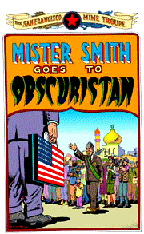 The San Francisco Mime Troupe has its local faithful following who
turn out for its traveling performance each summer in the San Lorenzo
Park. This is the first cut of a film that shows the Troupe's process
of creating a play, something they do at least once a year. Josh
Kornbluth was a guest writer working with the troupe on Mr. Smith.
The film starts with the first script meeting and goes through costumes,
sets, fights, music, pressure, and finally, on opening day, a product.
The San Francisco Mime Troupe has its local faithful following who
turn out for its traveling performance each summer in the San Lorenzo
Park. This is the first cut of a film that shows the Troupe's process
of creating a play, something they do at least once a year. Josh
Kornbluth was a guest writer working with the troupe on Mr. Smith.
The film starts with the first script meeting and goes through costumes,
sets, fights, music, pressure, and finally, on opening day, a product.
Link to San Francisco
Mime Troupe website.
Germinal (Director: Claude Berri, 1993, 170 min)
 Gorgeously photographed adaptation of an Emile Zola novel about
a 19th-century French miners' strike. An out-of-work railway worker
comes into town and by sheer luck has secured a job in the local
mine. He strikes up a friendship with an older miner. When conditions
in the mine get worse, the two men organize a strike. The bosses
bring in soldiers to deal with the strikers and tragedy follows.
Director Berri dedicated the movie to his union-activist father.
Zola's novel was an eloquent protest against the inhuman working
conditions common in late Nineteenth-Century European factories
and mines. French with subtitles.
Gorgeously photographed adaptation of an Emile Zola novel about
a 19th-century French miners' strike. An out-of-work railway worker
comes into town and by sheer luck has secured a job in the local
mine. He strikes up a friendship with an older miner. When conditions
in the mine get worse, the two men organize a strike. The bosses
bring in soldiers to deal with the strikers and tragedy follows.
Director Berri dedicated the movie to his union-activist father.
Zola's novel was an eloquent protest against the inhuman working
conditions common in late Nineteenth-Century European factories
and mines. French with subtitles.
Link to
Internet Movie Database (IMDb) page for Germinal.
Made In Thailand (Directors: Eve-Laure Moros and
Linzy Emery, 1999, 33 min)
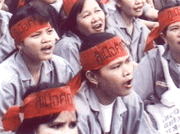 In Thailand, women make up 90 percent of the labor force responsible
for garments and toys for export by multinational corporations.
This powerful, revealing documentary about women factory workers
and their struggle to organize unions exposes the human cost behind
the production of everyday items that reach our shores. Probing
the profound impact of the New World Order on the populations that
provide the global economy with cheap labor, Made in Thailandalso
profiles women newly empowered by their campaign for human and worker's
rights. Several of these women are survivors of the 1993 Kader Toy
Factory fire, one of the worst industrial fires in history. Today
they are highly effective leaders in the grass-roots movement mobilizing
workers in their recently industrialized country.
In Thailand, women make up 90 percent of the labor force responsible
for garments and toys for export by multinational corporations.
This powerful, revealing documentary about women factory workers
and their struggle to organize unions exposes the human cost behind
the production of everyday items that reach our shores. Probing
the profound impact of the New World Order on the populations that
provide the global economy with cheap labor, Made in Thailandalso
profiles women newly empowered by their campaign for human and worker's
rights. Several of these women are survivors of the 1993 Kader Toy
Factory fire, one of the worst industrial fires in history. Today
they are highly effective leaders in the grass-roots movement mobilizing
workers in their recently industrialized country.
Link to Women Make Movies catalog page for Made In Thailand.
The Hidden Face of Globalization (Producer: National
Labor Committee, 2003, 34 min)
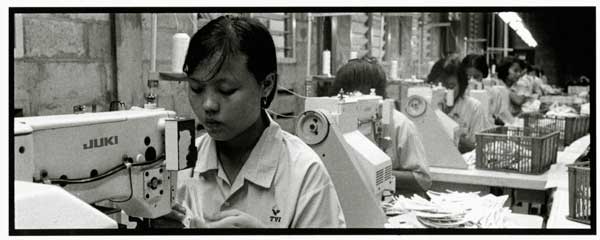 Ever wonder where the cheap clothes at Wal-Mart or the ubiquitous
Disney products come from? This revealing documentary examines the
sweatshop conditions in garment factories in Bangladesh where many
of these goods are made by predominantly women workers who are paid
less than 17 cents an hour. Includes unprecedented footage from
inside factories that produce for some of the largest corporations
in the world. A powerful window into the real impact of the global
economy. A Crowing Rooster Arts Production.
Ever wonder where the cheap clothes at Wal-Mart or the ubiquitous
Disney products come from? This revealing documentary examines the
sweatshop conditions in garment factories in Bangladesh where many
of these goods are made by predominantly women workers who are paid
less than 17 cents an hour. Includes unprecedented footage from
inside factories that produce for some of the largest corporations
in the world. A powerful window into the real impact of the global
economy. A Crowing Rooster Arts Production.
Love, Women and Flowers / Amor, Mujeres y Flores
(Director: Marta Rodriguez, 1988, 58 min)
 Flowers are Colombia's third largest export. Behind the beauty of
carnations sold in the U.S. is a horror story of hazardous working
conditions for 60,000 women who labor in the flower industry. The
use of pesticides and fungicides, some banned in the developed countries
that export them, has drastic health and environmental consequences.
This beautiful and powerful documentary is the final collaborative
effort of Marta Rodriguez and her husband Jorge Silva. The filmmakers
evoke the testimonies of the women workers and document their efforts
to organize with urgency and intimacy. Spanish with English sub-titles.
Flowers are Colombia's third largest export. Behind the beauty of
carnations sold in the U.S. is a horror story of hazardous working
conditions for 60,000 women who labor in the flower industry. The
use of pesticides and fungicides, some banned in the developed countries
that export them, has drastic health and environmental consequences.
This beautiful and powerful documentary is the final collaborative
effort of Marta Rodriguez and her husband Jorge Silva. The filmmakers
evoke the testimonies of the women workers and document their efforts
to organize with urgency and intimacy. Spanish with English sub-titles.
Link to Women Make Movies catalog page for Love, Women and Flowers.
Uprooted: Refugees of the Global Economy / Desarriagados
(Directors: Sasha Khokha, Ulla Nilsen, Jon Fromer, and Francisco
Herrera, 2001, 28 min)
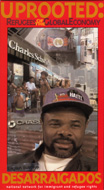 This documentary weaves together the stories of three immigrants
into a compelling tale of how the global economy (including U.S.
corporations and the International Monetary Fund) has forced immigrants
to leave their home countries. Maricel is one of thousands of women
encouraged by the Philippine government to work abroad as a domestic
in order to pay its international debt. Her employer, a top New
York corporate executive, refused to pay her the minimum wage. Free
trade destroyed Jessy and Jaime's family business in Bolivia; they
came to the United States and worked as janitors despite their engineering
degrees. Luckner left Haiti after working for 14 cents an hour at
a US-owned baseball factory that moved to China, in search of cheaper
labor costs. These powerful stories raise critical questions about
U.S. immigration policy in an era when corporations cross borders
at will. Voted Best of the Fest at Cine Latino Festival, 2002. Produced
by the National Network for Immigrant and Refugee Rights. Bilingual
with Spanish and English sub-titles.
This documentary weaves together the stories of three immigrants
into a compelling tale of how the global economy (including U.S.
corporations and the International Monetary Fund) has forced immigrants
to leave their home countries. Maricel is one of thousands of women
encouraged by the Philippine government to work abroad as a domestic
in order to pay its international debt. Her employer, a top New
York corporate executive, refused to pay her the minimum wage. Free
trade destroyed Jessy and Jaime's family business in Bolivia; they
came to the United States and worked as janitors despite their engineering
degrees. Luckner left Haiti after working for 14 cents an hour at
a US-owned baseball factory that moved to China, in search of cheaper
labor costs. These powerful stories raise critical questions about
U.S. immigration policy in an era when corporations cross borders
at will. Voted Best of the Fest at Cine Latino Festival, 2002. Produced
by the National Network for Immigrant and Refugee Rights. Bilingual
with Spanish and English sub-titles.
Link
to National Network for Immigrant and Refugee Rights page for Uprooted:
Refugees of the Global Economy.
From Wharf Rats to Lords of the Docks (Actor: Ian
Ruskin, 60 min)
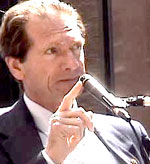 This one-man play performed live by Ian Ruskin is a human portrayal
of Harry Bridges' passion, struggles, and wicked sense of humor.
It features many of his own words—from his rallying speeches
of the 1930's to his electrifying testimony at his trials—and
covers his life from his childhood in Australia until near his retirement
in the 1970's. It includes the 1934 General Strike in San Francisco,
his hearings and trials, his marriages and divorces, the constant
controversy of a union involved in social and political issues here
and abroad, and the groundbreaking Mechanization and Modernization
agreement. It features rare labor songs and political parodies,
and is an exciting and entertaining way to explore 50 years of American
history. This theatre performance is an element of The Harry Bridges
Project, which has been organized to promote the legacy of this
important labor leader and to aid in educating the next generation.
This one-man play performed live by Ian Ruskin is a human portrayal
of Harry Bridges' passion, struggles, and wicked sense of humor.
It features many of his own words—from his rallying speeches
of the 1930's to his electrifying testimony at his trials—and
covers his life from his childhood in Australia until near his retirement
in the 1970's. It includes the 1934 General Strike in San Francisco,
his hearings and trials, his marriages and divorces, the constant
controversy of a union involved in social and political issues here
and abroad, and the groundbreaking Mechanization and Modernization
agreement. It features rare labor songs and political parodies,
and is an exciting and entertaining way to explore 50 years of American
history. This theatre performance is an element of The Harry Bridges
Project, which has been organized to promote the legacy of this
important labor leader and to aid in educating the next generation.
Link to The Harry Bridges Project website.
The Bus Riders Union (Director/Cinematographer:
Haskell Wexler, 1999, 86 min)
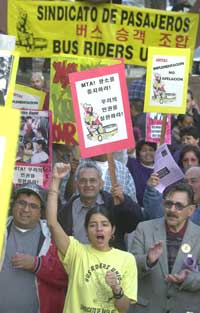 An uplifting and complex portrayal of one of the biggest—and
most unlikely—civil rights and mass transit grassroots organizations
in the U.S. Numerous multiracial leaders, mostly women, take on
Los Angeles' $3 billion transit agency with passion, humor and endless
sarcasm—and win. Wexler captures the joy of struggle on the
part of a polyglot group, the poor and minority bus riders, who
never lost their humanity in the 4-year effort, which was a project
of the LA Labor/Community Strategy Center.
An uplifting and complex portrayal of one of the biggest—and
most unlikely—civil rights and mass transit grassroots organizations
in the U.S. Numerous multiracial leaders, mostly women, take on
Los Angeles' $3 billion transit agency with passion, humor and endless
sarcasm—and win. Wexler captures the joy of struggle on the
part of a polyglot group, the poor and minority bus riders, who
never lost their humanity in the 4-year effort, which was a project
of the LA Labor/Community Strategy Center.
Link to the Bus Riders webpage.
|
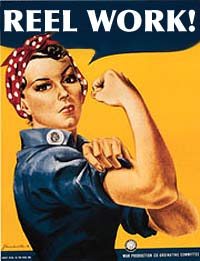
 Chaplin's masterpiece, without question the last great silent film,
made when everyone else was making talkies, is filled with sound
effects—the screeches, groans, and grinds of the machines—that
speak against modern society, the machine age, and progress. The
Little Tramp gets trapped in the coils of automation in this corrosive
satire on the dehumanizing effects of technology. Despite its pre-occupation
with Depression-era poverty and starvation, the film comes off as
a lighthearted comedy.
Chaplin's masterpiece, without question the last great silent film,
made when everyone else was making talkies, is filled with sound
effects—the screeches, groans, and grinds of the machines—that
speak against modern society, the machine age, and progress. The
Little Tramp gets trapped in the coils of automation in this corrosive
satire on the dehumanizing effects of technology. Despite its pre-occupation
with Depression-era poverty and starvation, the film comes off as
a lighthearted comedy.  This documentary follows three welfare recipients in New York City
from 1997 to 2000 as they participate in the largest welfare-to-work
program in the nation. When forced to work at city jobs for well
below the prevailing wage and deprived of the chance to go to school,
these individuals decide to fight back, demanding programs that
will actually help them move off of welfare and into jobs.
This documentary follows three welfare recipients in New York City
from 1997 to 2000 as they participate in the largest welfare-to-work
program in the nation. When forced to work at city jobs for well
below the prevailing wage and deprived of the chance to go to school,
these individuals decide to fight back, demanding programs that
will actually help them move off of welfare and into jobs.  This classic documentary recaptures the 1968 struggle for economic
justice among Memphis' sanitation workers, who earned so little
they qualified for welfare. In the film, retired workers recall
their fear as they challenged the white power structure when they
went on strike for higher wages and union recognition. The black
community mobilized behind the strikers, organizing mass demonstrations
and an Easter boycott of downtown businesses. In March of 1968,
Martin Luther King traveled to Memphis as part of his "Poor People's
Campaign" to expand the civil rights agenda to include economic
justice. King planned to march again on April 8, 1968, but was assassinated
four days earlier. A nonviolent march was held nonetheless, leading
to the city council granting most of the strikers' demands. At the
River I Stand was described in the Dallas Observer as "one of the
most clearheaded, evenhanded documentaries about the civil rights
movement you'll ever see, and a piece of gripping storytelling as
well."
This classic documentary recaptures the 1968 struggle for economic
justice among Memphis' sanitation workers, who earned so little
they qualified for welfare. In the film, retired workers recall
their fear as they challenged the white power structure when they
went on strike for higher wages and union recognition. The black
community mobilized behind the strikers, organizing mass demonstrations
and an Easter boycott of downtown businesses. In March of 1968,
Martin Luther King traveled to Memphis as part of his "Poor People's
Campaign" to expand the civil rights agenda to include economic
justice. King planned to march again on April 8, 1968, but was assassinated
four days earlier. A nonviolent march was held nonetheless, leading
to the city council granting most of the strikers' demands. At the
River I Stand was described in the Dallas Observer as "one of the
most clearheaded, evenhanded documentaries about the civil rights
movement you'll ever see, and a piece of gripping storytelling as
well."  The stepped up repression of anti-war demonstrators and trade unionists
took a new turn in the U.S. on April 7, 2003, when Oakland, California
police attacked a peaceful picket on the docks. The Labor Video
Project was there when Oakland police fired over a hundred shots
of rubber bullets and wooden projectiles as well as concussion grenades
to attack the anti-war protest. This video interviews the workers
on the picket line as well as ILWU longshoremen who were standing
by and were also targeted by the police and the company. It goes
behind the pictures to expose the reasons that trade unionists joined
the line and the reaction of ILWU Local 10 members to the attacks
and arrests of their business agent. There is also an international
campaign to defend ILWU BA Jack Heyman and the Oakland 25 who face
criminal charges for the April 7 incident.
The stepped up repression of anti-war demonstrators and trade unionists
took a new turn in the U.S. on April 7, 2003, when Oakland, California
police attacked a peaceful picket on the docks. The Labor Video
Project was there when Oakland police fired over a hundred shots
of rubber bullets and wooden projectiles as well as concussion grenades
to attack the anti-war protest. This video interviews the workers
on the picket line as well as ILWU longshoremen who were standing
by and were also targeted by the police and the company. It goes
behind the pictures to expose the reasons that trade unionists joined
the line and the reaction of ILWU Local 10 members to the attacks
and arrests of their business agent. There is also an international
campaign to defend ILWU BA Jack Heyman and the Oakland 25 who face
criminal charges for the April 7 incident.  Live footage of the historic statewide strike by clerical workers
in the Coalition of University Employees (CUE) and lecturers in
the University Council-American Federation of Teachers (UC-AFT)
who protested at five campuses against the abundant unfair labor
practices of the University of California. This fast-paced film
focuses on the strike at the UCSC campus, highlighting the tremendous
solidarity that emerged between campus and local unions, students,
and community members.
Live footage of the historic statewide strike by clerical workers
in the Coalition of University Employees (CUE) and lecturers in
the University Council-American Federation of Teachers (UC-AFT)
who protested at five campuses against the abundant unfair labor
practices of the University of California. This fast-paced film
focuses on the strike at the UCSC campus, highlighting the tremendous
solidarity that emerged between campus and local unions, students,
and community members.  The San Francisco Mime Troupe has its local faithful following who
turn out for its traveling performance each summer in the San Lorenzo
Park. This is the first cut of a film that shows the Troupe's process
of creating a play, something they do at least once a year. Josh
Kornbluth was a guest writer working with the troupe on Mr. Smith.
The film starts with the first script meeting and goes through costumes,
sets, fights, music, pressure, and finally, on opening day, a product.
The San Francisco Mime Troupe has its local faithful following who
turn out for its traveling performance each summer in the San Lorenzo
Park. This is the first cut of a film that shows the Troupe's process
of creating a play, something they do at least once a year. Josh
Kornbluth was a guest writer working with the troupe on Mr. Smith.
The film starts with the first script meeting and goes through costumes,
sets, fights, music, pressure, and finally, on opening day, a product.
 Gorgeously photographed adaptation of an Emile Zola novel about
a 19th-century French miners' strike. An out-of-work railway worker
comes into town and by sheer luck has secured a job in the local
mine. He strikes up a friendship with an older miner. When conditions
in the mine get worse, the two men organize a strike. The bosses
bring in soldiers to deal with the strikers and tragedy follows.
Director Berri dedicated the movie to his union-activist father.
Zola's novel was an eloquent protest against the inhuman working
conditions common in late Nineteenth-Century European factories
and mines. French with subtitles.
Gorgeously photographed adaptation of an Emile Zola novel about
a 19th-century French miners' strike. An out-of-work railway worker
comes into town and by sheer luck has secured a job in the local
mine. He strikes up a friendship with an older miner. When conditions
in the mine get worse, the two men organize a strike. The bosses
bring in soldiers to deal with the strikers and tragedy follows.
Director Berri dedicated the movie to his union-activist father.
Zola's novel was an eloquent protest against the inhuman working
conditions common in late Nineteenth-Century European factories
and mines. French with subtitles.  In Thailand, women make up 90 percent of the labor force responsible
for garments and toys for export by multinational corporations.
This powerful, revealing documentary about women factory workers
and their struggle to organize unions exposes the human cost behind
the production of everyday items that reach our shores. Probing
the profound impact of the New World Order on the populations that
provide the global economy with cheap labor, Made in Thailandalso
profiles women newly empowered by their campaign for human and worker's
rights. Several of these women are survivors of the 1993 Kader Toy
Factory fire, one of the worst industrial fires in history. Today
they are highly effective leaders in the grass-roots movement mobilizing
workers in their recently industrialized country.
In Thailand, women make up 90 percent of the labor force responsible
for garments and toys for export by multinational corporations.
This powerful, revealing documentary about women factory workers
and their struggle to organize unions exposes the human cost behind
the production of everyday items that reach our shores. Probing
the profound impact of the New World Order on the populations that
provide the global economy with cheap labor, Made in Thailandalso
profiles women newly empowered by their campaign for human and worker's
rights. Several of these women are survivors of the 1993 Kader Toy
Factory fire, one of the worst industrial fires in history. Today
they are highly effective leaders in the grass-roots movement mobilizing
workers in their recently industrialized country.  Ever wonder where the cheap clothes at Wal-Mart or the ubiquitous
Disney products come from? This revealing documentary examines the
sweatshop conditions in garment factories in Bangladesh where many
of these goods are made by predominantly women workers who are paid
less than 17 cents an hour. Includes unprecedented footage from
inside factories that produce for some of the largest corporations
in the world. A powerful window into the real impact of the global
economy. A Crowing Rooster Arts Production.
Ever wonder where the cheap clothes at Wal-Mart or the ubiquitous
Disney products come from? This revealing documentary examines the
sweatshop conditions in garment factories in Bangladesh where many
of these goods are made by predominantly women workers who are paid
less than 17 cents an hour. Includes unprecedented footage from
inside factories that produce for some of the largest corporations
in the world. A powerful window into the real impact of the global
economy. A Crowing Rooster Arts Production.  Flowers are Colombia's third largest export. Behind the beauty of
carnations sold in the U.S. is a horror story of hazardous working
conditions for 60,000 women who labor in the flower industry. The
use of pesticides and fungicides, some banned in the developed countries
that export them, has drastic health and environmental consequences.
This beautiful and powerful documentary is the final collaborative
effort of Marta Rodriguez and her husband Jorge Silva. The filmmakers
evoke the testimonies of the women workers and document their efforts
to organize with urgency and intimacy. Spanish with English sub-titles.
Flowers are Colombia's third largest export. Behind the beauty of
carnations sold in the U.S. is a horror story of hazardous working
conditions for 60,000 women who labor in the flower industry. The
use of pesticides and fungicides, some banned in the developed countries
that export them, has drastic health and environmental consequences.
This beautiful and powerful documentary is the final collaborative
effort of Marta Rodriguez and her husband Jorge Silva. The filmmakers
evoke the testimonies of the women workers and document their efforts
to organize with urgency and intimacy. Spanish with English sub-titles.
 This documentary weaves together the stories of three immigrants
into a compelling tale of how the global economy (including U.S.
corporations and the International Monetary Fund) has forced immigrants
to leave their home countries. Maricel is one of thousands of women
encouraged by the Philippine government to work abroad as a domestic
in order to pay its international debt. Her employer, a top New
York corporate executive, refused to pay her the minimum wage. Free
trade destroyed Jessy and Jaime's family business in Bolivia; they
came to the United States and worked as janitors despite their engineering
degrees. Luckner left Haiti after working for 14 cents an hour at
a US-owned baseball factory that moved to China, in search of cheaper
labor costs. These powerful stories raise critical questions about
U.S. immigration policy in an era when corporations cross borders
at will. Voted Best of the Fest at Cine Latino Festival, 2002. Produced
by the National Network for Immigrant and Refugee Rights. Bilingual
with Spanish and English sub-titles.
This documentary weaves together the stories of three immigrants
into a compelling tale of how the global economy (including U.S.
corporations and the International Monetary Fund) has forced immigrants
to leave their home countries. Maricel is one of thousands of women
encouraged by the Philippine government to work abroad as a domestic
in order to pay its international debt. Her employer, a top New
York corporate executive, refused to pay her the minimum wage. Free
trade destroyed Jessy and Jaime's family business in Bolivia; they
came to the United States and worked as janitors despite their engineering
degrees. Luckner left Haiti after working for 14 cents an hour at
a US-owned baseball factory that moved to China, in search of cheaper
labor costs. These powerful stories raise critical questions about
U.S. immigration policy in an era when corporations cross borders
at will. Voted Best of the Fest at Cine Latino Festival, 2002. Produced
by the National Network for Immigrant and Refugee Rights. Bilingual
with Spanish and English sub-titles.  This one-man play performed live by Ian Ruskin is a human portrayal
of Harry Bridges' passion, struggles, and wicked sense of humor.
It features many of his own words—from his rallying speeches
of the 1930's to his electrifying testimony at his trials—and
covers his life from his childhood in Australia until near his retirement
in the 1970's. It includes the 1934 General Strike in San Francisco,
his hearings and trials, his marriages and divorces, the constant
controversy of a union involved in social and political issues here
and abroad, and the groundbreaking Mechanization and Modernization
agreement. It features rare labor songs and political parodies,
and is an exciting and entertaining way to explore 50 years of American
history. This theatre performance is an element of The Harry Bridges
Project, which has been organized to promote the legacy of this
important labor leader and to aid in educating the next generation.
This one-man play performed live by Ian Ruskin is a human portrayal
of Harry Bridges' passion, struggles, and wicked sense of humor.
It features many of his own words—from his rallying speeches
of the 1930's to his electrifying testimony at his trials—and
covers his life from his childhood in Australia until near his retirement
in the 1970's. It includes the 1934 General Strike in San Francisco,
his hearings and trials, his marriages and divorces, the constant
controversy of a union involved in social and political issues here
and abroad, and the groundbreaking Mechanization and Modernization
agreement. It features rare labor songs and political parodies,
and is an exciting and entertaining way to explore 50 years of American
history. This theatre performance is an element of The Harry Bridges
Project, which has been organized to promote the legacy of this
important labor leader and to aid in educating the next generation.
 An uplifting and complex portrayal of one of the biggest—and
most unlikely—civil rights and mass transit grassroots organizations
in the U.S. Numerous multiracial leaders, mostly women, take on
Los Angeles' $3 billion transit agency with passion, humor and endless
sarcasm—and win. Wexler captures the joy of struggle on the
part of a polyglot group, the poor and minority bus riders, who
never lost their humanity in the 4-year effort, which was a project
of the LA Labor/Community Strategy Center.
An uplifting and complex portrayal of one of the biggest—and
most unlikely—civil rights and mass transit grassroots organizations
in the U.S. Numerous multiracial leaders, mostly women, take on
Los Angeles' $3 billion transit agency with passion, humor and endless
sarcasm—and win. Wexler captures the joy of struggle on the
part of a polyglot group, the poor and minority bus riders, who
never lost their humanity in the 4-year effort, which was a project
of the LA Labor/Community Strategy Center.